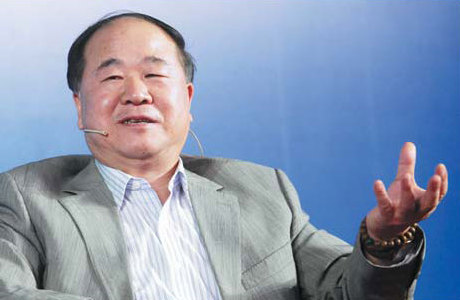 |
|
Nobel Prize laureate Mo Yan explores with Syrian-born poet Adonis the significant role of translation in today's literary world. Gong Lei / Xinhua
|
Cultural identity, the spirit of introspection and writers' mission are among the topics that Syrian-born poet Adonis explored with Nobel Prize winner Mo Yan and other Chinese writers, in a recent talk organized by Beijing Normal University International Writing Center.
Both Adonis and Mo Yan, who have an increasing international readership, concluded that the one factor which facilitates and hinders their efforts is translation.
Having nearly all his novels published in French and at least six in English, Mo Yan says he admires Adonis, a fluent speaker of Arabic and French, because he is involved in the translation himself, guaranteeing precision.
Mo Yan says today, Chinese writers' writing is frequently influenced by the increasing possibility of overseas publication.
It often leads to the subconscious sacrifice of the diversity of dialects, the uniqueness of cultural expressions and the smoothness of writing itself, simply to facilitate the translation, he adds.
"From the perspective of literature and art, it's undoubtedly a huge loss. My attitude is, forget the translators when you write. Care not about whether they feel happy to translate. The real talented translators aren't afraid of difficulties," he says.
"It's not right either to require translators to be completely faithful because the search of a linguistic counterpart is a creation itself, full of imagination. I tend to be open-minded with the translators. I think we should allow them to trim the book appropriately on condition that it doesn't affect the gist as a whole."
Adonis agrees, adding it's even more difficult to translate a poem.
Poetry is more than a structure of language, he says, but also that of thinking and emotions. In terms of the relationship between concept, language and object, he adds, no two languages are on an equal footing.
"Therefore, translators of poems must break the original relationship between language and object, and establish a similar relationship and structure applicable to the translator's mother language," he says.
"In this case, translating poems means betrayal. But sometimes the translator has to betray (the original language) to be faithful to readers of his mother tongue. In other words, betrayal is part of loyalty."
As difficult as it is, translation of foreign literature and poetry, in Adonis' opinion, is a way to explore the mentality of "the others" at a deep level. The importance of translation is, he says, to serve as "the most fundamental element of world culture in the future".
"The importance also lies in the language that a translator uses, especially one that he uses while translating poems. It can enrich his mother tongue. To some extent, it can change the structure of his mother language," Adonis says.
hanbingbin@chinadaily.com.cn
We recommend:
